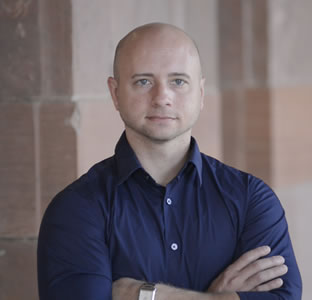Posted on December 9, 2014 by Lety Laurel

Nathan Hearn
Hearn will complete a master’s degree this month at UTSA, proceed to doctoral work, and teach and research labor economics.
Right out of high school in 2003, Hearn served three tours in Iraq “building bombs and shooting rockets,” as he describes it. He earned two Navy and Marine Corps Achievement Medals and one Certificate of Commendation for conflict actions. During the tours, he sustained only a shoulder injury, from which he recovered. After being honorably discharged in January 2008, he began to focus on higher education.
Calling Houston his most recent hometown, Hearn grew up in a family living the military life in Japan, California and Illinois. He earned two associate degrees at Lone Star Community College in the Houston area, then was a supplemental instructor in calculus and algebra at the college.
After completing a B.A. at Texas State in political science and economics with a minor in math, he came to UTSA to earn his master’s degree, based on the excellent reputation of the economics program. After receiving his degree, he will proceed to a Ph.D. program in economics.
“UTSA has helped me narrow my focus and determine my field of study in a Ph.D. program,” said Hearn. “I’ve taken some Ph.D.-level classes here and have been fortunate to work with many research-active professors including Melody Lo, who is chair of the economics department and knows a lot about statistics and econometrics.”
A current UTSA teaching assistant in microeconomics and macroeconomics, Hearn plans to continue research on how jobs change over the decades and the influence of technology in the workforce.
“There are two major schools of thought in economics — the supply side, which is based on limiting or minimizing government involvement within the economy, and the demand side, which is centered around the need for government intervention within the economy,” said Hearn.
“I want to come up with a third model that is a cross between the two. My ultimate goal is to do something that would help people more and add something to society worth remembering.”


